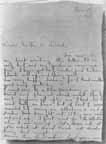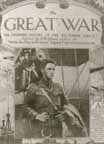|
20 BYGONES ALBERT
BALL. Aces high for |
 |
|
20 BYGONES ALBERT
BALL. Aces high for |
 |
|
EIGHTY years ago Albert Ball crashed to his death in a field near Annouellin, northern France. It was not a particularly noble end for the heroic young pilot. He had disappeared into clouds after tangling with a German Albatross fighter plane. According to a German officer on the ground who witnessed the scene, Ball's SE5 emerged upside down, its propeller stopped. Most evidence suggests lack of fuel or some malfunction brought his SE5 down - not a blaze of combat glory. Ironically, May 71917 was supposed to be his last day at the front. Thanks to his remarkable exploits - he was credited with a final tally of 43 kills - he was Britain's hottest wartime property, the pop idol of his day. Dark-haired and handsome, he was mobbed by girls in the street, his Nottingham home besieged by worshipping admirers. In the months before his death, he had been used by the War Office to boost morale at home. The news from the front was always bad. Casualties were rising, victory seemed still far away, but here was a man, young and dashing, who had survived, gloriously, while vanquishing his enemy at every turn. By the age of 20, he had already gained the triple DSO. His country needed him alive and so the War Office ordered: "You are not even to attack a Zeppelin. Not even if one flies overhead." But Ball had never seen eye to eye with authority and he pleaded for a return to action. The emergence of a new German fighter plane, wreaking havoc over the Western Front, forced the authorities to relent. To gain mastery of the skies, a new British fighter, the SE5, had been |
developed at Farnborough for an elite squadron ... which needed an elite leader. The War Office decided to gamble one more time with Ball's life, with one important condition. On May 5, he had been involved in a ferocious combat from which he was lucky to survive. "God is very good to me," he told his commanding officer. "I was certain the Hun meant to ram me ... God must have me in his keeping."  Albert Ball, ready for action On May 7 a letter arrived asking for a situation report on Ball. Its tone suggested he was about to be relieved and given another award. As the holder of the DSO with two bars and the Military Medal, it could only be the VC. As the letter dropped on the desk of 56 Squadron Commanding Officer, Ball led a flight of SE5s into the sky in search of Baron Manfred von Richthofen's Circus of Albatros fighters over Douai. The sky was heavy with thunderclouds when Ball spotted the enemy and fired a red Very light to signal action. Fighters wheeled above the trenches in bitter combat, both sides suffering heavy losses. But Ball was still in the thick of it, chasing an Albatros into the clouds, swooping low over the village of Annouelin and exchanging bursts of gunfire before the German crash landed. |
The SE5 climbed and disappeared into a cloud. When it emerged again it was clearly in trouble and finally crashed behind a line of trees. A young German lieutenant Franz Hailer later wrote: "We examined the wreckage and we all came to the conclusion that the aircraft had not been shot down ... the dead pilot had no marks or scratches and had not been wounded. "I looked through his papers and found it was Captain Ball. "We called him the English Richthofen." He was to go to France for only one month. Thirty one days which were up on May 8, 1917. We will never know if Ball would have hung up his flying boots had he survived that day. The signs were there. He had fallen in love with a girl named Flora Young, from St Albans, and before his return to France, had spent every day in her company, finally becoming engaged when he gave his beloved 'Bobs' his gold identity disc. She was not there to see him leave from an airfield near London for the final time. But they exchanged letters which Ball read over and over again, oblivious to anyone around him. It was at this time, Ball began to reveal his growing disenchantment with fighting. "I do get tired of always living to kill and am really beginning to feel like a murderer," he wrote to his father. "Shall be so pleased when I have finished." He had nothing left to prove. He had surpassed the total of kills claimed by his nearest rival, a Frenchman George Guynemer. |
ALBERT Ball was born on August 18 1896 and was educated at Lenton Church School, Nottingham High School and Trent College, Long Eaton. A reluctant scholar, his talents lay in work requiring a co-ordination of hand and mind and he excelled at woodwork, metalwork and photography. Although he was a member of Trent College's Officer Training Corps, a military career was not onis agenda and had war ~ not intervened, a life in Engineering seemed to lay ahead. But after August 1914, Ball became caught up in the fervour to fight and enlisted with the Sherwood Foresters as a private. He soon gained a commission - due to his upbringing and OTC training - and while in London became attracted to the Royal Flying Corps. He paid for private pilot's lessons and by 1915 had gained his wings. He was famed for his skill and coolness under fire and for a flying tactic which allowed him to defeat every opponent that came his way. On his death he was the holder of the DSO with two bars and the Military Medal. The Victoria Cross was awarded posthumously. . The Nottingham branch of the Royal Air Force Association will organise the annual Albert Ball memorial parade and service on the Castle Green at 7.30pm on May 7. Civic leaders and representatives of the armed forces will be among those attending. |
He was to go to France for only one month. Thirty one days which were up on May 8, 1917.
We will never know if Ball would have hung up his flying boots had he survived that day.
The signs were there. He had fallen in love with a girl named Flora Young, from St Albans, and before his return to France, had spent every day in her company, finally becoming engaged when he gave his beloved 'Bobs' his gold identity disc.
She was not there to see him leave from an airfield near London for the final time.
But they exchanged letters which Ball read over and over again, oblivious to anyone around him.
It was at this time, Ball began to reveal his growing disenchantment
with fighting.
"I do get tired of always living to kill and am really beginning to feel like a murderer," he wrote to his father.
"Shall be so pleased when I have finished."
He had nothing left to prove. He had surpassed the total of kills claimed by his nearest rival, a Frenchman George Guynemer.
Left: Every inch the hero... Albert Ball, ready for action